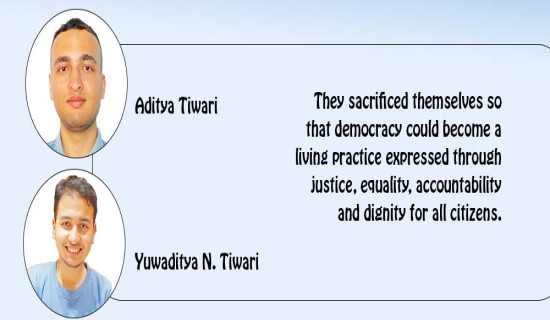- Friday, 30 January 2026
Need To Regulate Sales Of OTC Drugs
Over-the-counter (OTC) drugs are easily available in the market. These are the drugs that one can buy from a pharmacy without a doctor’s prescription. That is why such drugs are also called non-prescription drugs. The US Food and Drug Administration (FDA) determines whether certain drugs are prescription or non-prescription drugs. Prescription drugs are safe and effective when administered under a doctor’s supervision. On the other hand, non-prescription drugs are considered safe and effective even if administered without a doctor’s supervision. However, directions given on the label should be followed. People may also follow the directives given by healthcare professionals. Following such directions may make OTC drugs safer and more effective.
OTC drugs generally contain vitamins, minerals, herbs, supplements and certain medications. They are used to treat a wide range of medical conditions. Such conditions include both illnesses and deficiencies. Pains, aches, burns, itches, acne, coughs, diarrhea, fever, headaches and a sore throat are some of the conditions OTC drugs can cure. Some of such drugs can prevent certain conditions such as tooth decay or athlete’s foot. Some OTC drugs can play an active role in managing recurring conditions such as vaginal yeast infections or migraines.
Harmful effects
OTC drugs are increasingly used in developing and least developed countries like Nepal. Most people use such drugs because they are readily available in the market. The use of such drugs is cost-effective because people do not have to visit the doctor, which saves them both money and time. It is also convenient for them because they can go to a pharmacy and buy the drugs they require. After all, relying on shamans is better than relying on OTC drugs. However, OTC drugs are not free from harmful effects. Using OTC drugs may give rise to allergic reactions because such drugs are used without a prescription and a doctor’s supervision. OTC drugs could interact with other drugs, foods or drinks. Such interaction is deleterious to the health. The prolonged use of OTC drugs may give rise to physical and psychological dependence.
Moreover, OTC drugs may not like people with underlying medical conditions. For example, people with hypertension should not use certain decongestants because they may be allergic to certain drugs. Likewise, OTC drugs may not be safe for pregnant women. Pregnant women have to take drugs under medical supervision only. In similar vein, OTC drugs should be avoided in paediatric care. Children are not little adults. Their bodies are sensitive. So they should get medical attention under the supervision of a paediatrician. The use of OTC drugs may conceal a more serious medical condition. The prolonged use of antacids and gastric anti-secretory drugs can, for example, delay the diagnosis of gastric cancer.
Likewise, the prolonged use of anti-headache drugs may hamper the detection of brain tumours. And the use of aspirin and acetaminophen is associated with gastric toxicity. As OTC drugs are freely available in the market, there is a great possibility that some of such drugs may be misused. OTC drugs should not be taken longer than or in higher doses than what the label recommends. It is essential to take drugs in correct doses and up to the required duration. People may overdose themselves on drugs, which may adversely affect their health. This is inadvertent misuse of OTC drugs.
People may misuse OTC drugs for euphoria. They may deliberately overdose themselves on such drugs. They may also mix two or more such drugs to enhance euphoria. The prolonged misuse of OTC drugs may lead to drug addiction. When people are fed up with mild drugs, they may begin using hard drugs such as hemp, cannabis or hashish. OTC drugs are used for minor conditions.
They are not used for severe illnesses. In such a case, doctors should be consulted. However, people should be careful while taking OTC drugs. The US FDA mandates that there should be clear drug labelling. People should follow the instructions given on the label.
People tend to follow the instructions given by the pharmacist while using OTC drugs. Qualified pharmacists can also give right directions on the safe use of drugs. That is why, pharmacist counselling is considered essential for the safe use of drugs. Awareness about the correct and safe use of OTC drugs is a must for the sake of maintaining good public health. Drugs, whether OTC or prescription, should have clear indications, counter-indications and limitations on the label explaining desired uses, the duration of use, dosage and side reactions, among others. It is not possible for pharmacies to sell drugs on a doctor’s prescription only because people do not visit doctors for minor illnesses or conditions.
Monitoring
But pharmacies should know which drugs are to be sold as prescription drugs and which drugs as non-prescription drugs. For example, they should not sell tranquilisers or sedatives without a doctor’s prescription. In Nepal, the use of OTC drugs is widespread. There are many brands of drugs in the market. The government should meticulously monitor pharmacies. The pharmacies may be selling date-expired drugs. The use of such drugs does more harm than good. The pharmacists should adhere to medical ethics. They should not sell any drugs to anyone. The haphazard use of OTC, or any other, drugs may give rise to a grave public health concern.
There is the Drugs Act 2035 (1978) in the country. There are also drug-related plans, policies and directives. These plans, policies and directives should be strictly implemented because no one has the right to play havoc with public health. So the government, pharmacies, general public and other stakeholders should ensure that OTC and other drugs are used in a safe and sound, and effective manner.
(Maharjan has been regularly writing on contemporary issues for this daily since 2000.)

















